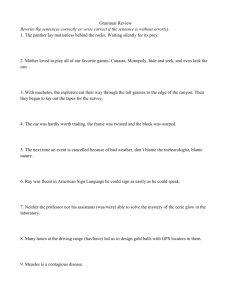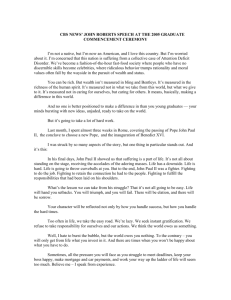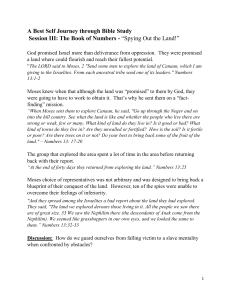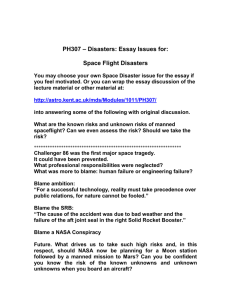Sermon 2
advertisement
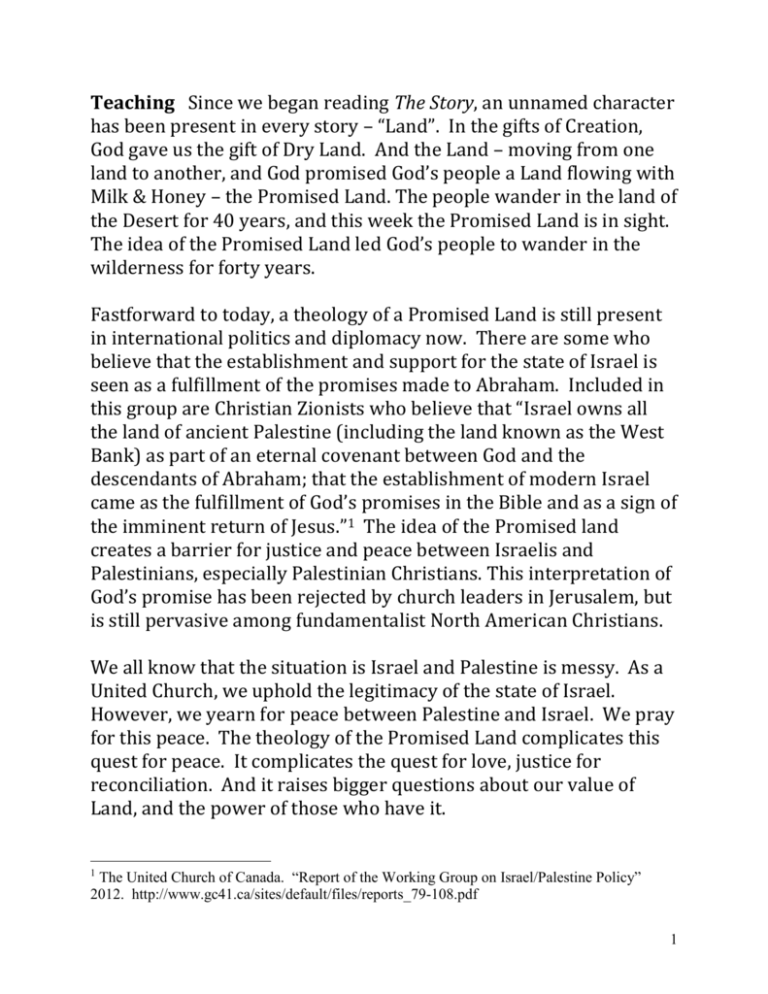
Teaching Since we began reading The Story, an unnamed character has been present in every story – “Land”. In the gifts of Creation, God gave us the gift of Dry Land. And the Land – moving from one land to another, and God promised God’s people a Land flowing with Milk & Honey – the Promised Land. The people wander in the land of the Desert for 40 years, and this week the Promised Land is in sight. The idea of the Promised Land led God’s people to wander in the wilderness for forty years. Fastforward to today, a theology of a Promised Land is still present in international politics and diplomacy now. There are some who believe that the establishment and support for the state of Israel is seen as a fulfillment of the promises made to Abraham. Included in this group are Christian Zionists who believe that “Israel owns all the land of ancient Palestine (including the land known as the West Bank) as part of an eternal covenant between God and the descendants of Abraham; that the establishment of modern Israel came as the fulfillment of God’s promises in the Bible and as a sign of the imminent return of Jesus.”1 The idea of the Promised land creates a barrier for justice and peace between Israelis and Palestinians, especially Palestinian Christians. This interpretation of God’s promise has been rejected by church leaders in Jerusalem, but is still pervasive among fundamentalist North American Christians. We all know that the situation is Israel and Palestine is messy. As a United Church, we uphold the legitimacy of the state of Israel. However, we yearn for peace between Palestine and Israel. We pray for this peace. The theology of the Promised Land complicates this quest for peace. It complicates the quest for love, justice for reconciliation. And it raises bigger questions about our value of Land, and the power of those who have it. The United Church of Canada. “Report of the Working Group on Israel/Palestine Policy” 2012. http://www.gc41.ca/sites/default/files/reports_79-108.pdf 1 1 Biblical scholars of the 20th century wondered about what it was like for the people already in the ‘promised land’ when the Israelites finally entered it. What was it like for the Canaanites for the Israelites to take over? This story connects to our own story in Canada. It speaks to the situation that First Nations peoples in Canada who continue to feel the effects of Europeans taking over their land. While our country pursues Truth and Reconciliation, we in the United Church recognize that they were here first. We’ve also honoured the Land that our churches stand on by the adding the Mohawk to our Crest, “All My Relations” and acknowledging in our meetings that this Land was important to them & is important to us. Sermon The Story Chapter 6 – Wandering Prayer: Holy One, your word is a light in the darkness and a source of blessing. Pour out your Holy Spirit upon us; enliven our hearts and minds as we hear your word for us today. Amen. Road trips have a special significance for many of us, whether it is a family road trip across Canada or a trip to visit grandma. What we remember about these trips are not the uneventful ones, where nothing exciting really happened. The road trips we remember are the ones where things didn’t go according to plan – the car breaks down, you ran out of gas, you got stuck in a snow storm, someone read the map wrong and you got lost, maybe a short trip became a long adventure. Regardless of what exactly happened, I bet that during these memorable trips, there was some complaining – “I’m 2 hungry, can we stop for a snack”? Maybe you were fighting with your sibling, “Mom, he hit me”, or someone nagged, ‘Are we there yet?’ or constant complained about getting lost. On a road trip, when things go wrong, it seems so easy to complain about anything and everything. In fact, in all parts of life today, we like to complain a lot. The experience of the people of Israel in the wilderness was much like a road trip. They ran into trouble along the way and often complained. The chapter this week provides many examples of the Israelites encountering trouble in their road trip to the Promised Land and complaining about it. They left a hard life of slavery. God is leading them to freedom. But things aren’t going so well. They are in the barrenness of the wilderness. There are no springs for water. They are thirsty and hopeless. The whole group together protests to Moses and Aaron. Like an angry mob, they gather before their leaders to whine and lament. “Why did you do this to us? Why were we brought out to this place to die? There’s no fruit and nothing to drink.” And, someone is to blame for this dire situation. They seem blame to Moses for the impending genocide. They think that death is nearly upon them all. They appear to be complaining to Moses, but they are really complaining to God. They are misdirecting their anger for God, at Moses. It is like being mad about work, but coming home and taking it out on your spouse. The 3 blame is misdirected. God is to blame because it was under God’s power and leadership that they escaped Egypt. God was the one who had led them into the wilderness. God had guaranteed to lead them to the Promised Land, but now was forcing them to nearly die. The people of God have hit a snag. The road trip was going along well and now there is no service station anywhere, so they start to complain and blame. Complaining isn’t an ancient attribute of people found in biblical stories. Complaining is ever present in our own world. We complain about money. We complain about our jobs. We complain about our significant relationships or lack there of. We complain about our own decisions and the choices of others. We complain about the state of our lives and the world. We complain about politicians and politics. And we, in the church, are not immune from this complaining. Sometimes we complain about the declining membership numbers or we complain about the new hymn that we don’t like. At certain times of the year, we complain about not being able to meet our budget. In some churches, we complain about the noise of children in worship. A culture of complaint is present in our church and our society. Just like the people of Israel, blame is often present in our grumbling. In our protesting, we often blame others. We complain about not having enough money and blame our spouse for spending 4 too much. We complain about our jobs and blame our boss. We complain about climate change in our world and blame polluting corporations. We complain about our shrinking church and blame the absent young people. Blame is a key element of the culture of complaint. But, are we like the Israelites who blame Moses, as a smoke screen laying our true blame on God? I think that sometimes, this can be the case. Sometimes we can blame others, but in our hearts, we misdirect the blame because we are really pointing the finger at God. We are blaming God for the situation that we are in. We are blaming God for appearing to be deaf to our pleas. We are blaming God for seeming not care about us. We are blaming God for seeming to be absent. But, God hears and provides. God, who brought the Israelites out of Egypt, has not abandoned them. As they continue on their road trip, God has not forgotten them. God cares about the people of Israel. God hears their cries. Through divine action, God affirms God’s presence with them. God is with them at the Tabernacle. God tells Moses how to make water flow from the rock. God heard the hungry cries for food and provided more quail than the people could eat or gather. God does this so that the people know that God is God. God hears and provides for the people. God’s actions stop the people from complaining. These actions show that God is the one who brought them out of Egypt and has not abandoned them. God 5 provides to show that God has not forgotten them. God cares about the people. God hears their cries. God affirms God’s presence with them. As the people of Israel continue the road trip, God hears their complaints and provides for them. In the midst of the wilderness, God provides the people with the fullness of life. Just as God’s love was shown to the people of Israel through the simple and ordinary things of life – quail and water, God’s grace is shown to us today through the ordinary things of life – bread for the journey. In the ordinary things of the road trip of life, God’s love is apparent. God is with us here and now. God hears us too. God listens to all of our complaining and blaming. And God loves us through it all. Through Christ, God continues to provide us with the fullness of life wherever the road may lead. 6
